President Bush agreed yesterday to share nuclear technology and information with India during the visit of Indian Prime Minister Manmohan Singh to the White House. While this agreement is still subject to the consent of Congress, this marks a departure from long-standing U.S. policy against helping developing nations develop nuclear weapons. India, which has not signed on to the Non-Proliferation Treaty, has in recent years been seeking further nuclear capabilities. Proponents say this would cement India’s status as an emerging power and provide balance with other regional powers, most notably China.
Stephen Cohen, a senior fellow in the Foreign Policy Studies Program at The Brookings Institution and author of “India: Emerging Power,” discussed President Bush’s agreement to share nuclear technology with India.
Philadelphia, Pa.: First, and obviously, how is Pakistan taking to this? Second, and also very importantly, aren’t we sending mixed signals to China: please be our friend, but, just in case, we want to be able to destroy you if need be? Will the negative reactions outweigh potential benefits of this move?
Stephen Cohen: You are right to ask these tough questions—politics, especially international politics, is inherently tough,otherwise these issues would be taken care of by normal diplomacy.
Pakistan will regard the recent US-India agreement as further evidence of a) India’s attempt to become South Asia’s dominamt power, and b) that the Americans are willing, at least to some degree, to help India do this. Pakistan will in turn try to improve its relations with China and even Russia, while using the Americans to constrain India as best as it can. The real question is whether this move will make it easier for India to ignore Kashmir.
Some Chinese will regard this agreeemnt as evidence that India is lining up to contain China, others will recognize that India may be trying to “free ride” on American power, and that India and China can work out a strategic accommodation in the long run, both concerned about American strategic dominance. As they say, “time will tell,” in that the calculations are subtle and complicated, but I am personally convinced that if India exercises restraint, they have promised not to test nuclear weapons which would enable them to develop a second generation device—then this will not be seen as an anti-China development. Big questions remain: will a more powerful India be more accommodating or less.
The Brookings Institution is committed to quality, independence, and impact.
We are supported by a diverse array of funders. In line with our values and policies, each Brookings publication represents the sole views of its author(s).



Commentary
The U.S. and India: Sharing Nuclear Technology?
July 19, 2005